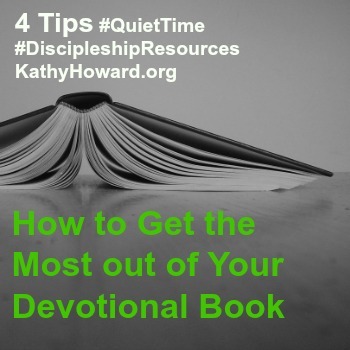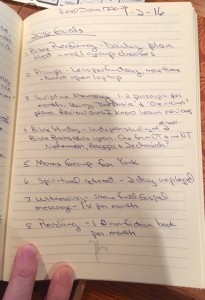Kathy Howard's Blog: Unshakeable Faith for Life, page 51
January 28, 2016
7 Things God Cannot Do
 Yes, I know. God is all-powerful, all-knowing, sovereign, and holy. I fully embrace all that God’s Word says about who He is, how He works, and what He can do. But there are some things that God cannot – or will not – do precisely because of who He is.
Yes, I know. God is all-powerful, all-knowing, sovereign, and holy. I fully embrace all that God’s Word says about who He is, how He works, and what He can do. But there are some things that God cannot – or will not – do precisely because of who He is.
These 7 things are not a comprehensive list, but they will all help us better understand our one, true God. I pray they also help you to worship Him more passionately and trust Him more completely.
7 Things God Cannot Do
God cannot be wrong or make a mistake – Everything God does is right. His knowledge is perfect (Job 37:16). All His works are perfect (Deut 32:4). He never even makes an “honest mistake.”
God cannot sin – God is holy. He is “light” and in Him there is no darkness (1 John 1:5). Perfect holiness. Not a speck of unholiness. God cannot do anything against His perfect, holy nature. He cannot do evil or be tempted by evil (James 1:13).
God cannot lie – Yes, a lie is sin, so this one is covered by #2. However, since the Bible makes a point of telling us this specifically, I thought it was worth emphasizing! God doesn’t lie like we humans do. He only tells the truth, all the time, every time. (Hebrews 6:18, Titus 1:2, Numbers 23:19)
God cannot change – Perfection cannot become more perfect. Since God has perfect knowledge and perfect character, He cannot change His mind or improve His behavior. (Malachi 3:6). By the way, we shouldn’t dare to “update” God’s Word or standards to match our times. Our culture may be changing constantly, but God “does not change like shifting shadows” (James 1:17).
God cannot break a promise – We can always take God at His word. He is faithful to keep His covenants. What He says, He will do. (Psalm 89:34)
God cannot get tired – No matter how much God accomplishes, how great and far-reaching His works, He will not grow weary or fatigued (Isaiah 40:28). In fact, He has strength in abundance and is willing to share His strength with us! (Isaiah 40:31)
God cannot stop “being” – Our Creator God is the God who “IS.” His personal name, Yahweh, expresses the nature of His existence. He exists because He is. He exists outside of time. He has not ever “not existed” at any point, in any dimension. By nature of who He is, He must exist. Isn’t that mind blowing? (Exodus 3:13-15, Psalm 90:1-5, Revelation 1:1-8)
So, what do you think? Do you agree that there are some things God cannot do?
7 things #God #cannot do
Click To Tweet
The post 7 Things God Cannot Do appeared first on Kathy Howard.
January 25, 2016
A Scary Prayer

 Some years ago, I attended a three-day conference for Christian speakers. We learned things like various techniques and presentation styles, how to do outlines, and how to engage your audience. We also practiced. Every afternoon they divided us up and each of us spoke briefly to our groups. We evaluated each other on delivery, personality, body language, and more.
Some years ago, I attended a three-day conference for Christian speakers. We learned things like various techniques and presentation styles, how to do outlines, and how to engage your audience. We also practiced. Every afternoon they divided us up and each of us spoke briefly to our groups. We evaluated each other on delivery, personality, body language, and more.
The final day was our most important presentation. This time our group leader would evaluate each of us. The founder of the organization would also be popping into various groups at different times.
I wasn’t overly nervous, but when my turn came, SHE walked in the room and sat down. My speaking ability would be evaluated by my peers, my group leader, and the very experienced founder of the organization.
I felt exposed and vulnerable. What would SHE think? What flaw would she spot? What weakness would she discern?
As it turned out, she was very encouraging and helpful. But of course she couldn’t see everything about me. She didn’t know my insecurities.
What about you? Have you ever been evaluated? Maybe it was in a speech class, piano recital, or a yearly job performance review. We’ve all faced an evaluation at some point.
But I dare say we rarely ask for it. We don’t usually initiate the scrutiny.
But that’s exactly what the psalmist David did. And it wasn’t just some other lowly human he invited to take a really close look. Nope. David asked God Almighty, the One who knows all and sees all, to thoroughly examine his heart and mind.
Search me, God, and know my heart; test me and know my anxious thoughts. See if there is any offensive way in me, and lead me in the way everlasting. Psalm 139:23-24
That sounds super scary to me. I mean, I know God knows it all already, but to purposefully make myself so incredibly vulnerable… That’s like one of those dreams where you walk into a room full of people only to discover you wore your birthday suit.
Are you willing to invite God’s scrutiny? #Ps139
Click To Tweet
But here’s the thing. God is totally faithful. Completely trustworthy. He wants only the best for us. He desires for us to grow into our full potential so we can be useful and effective for His good purposes.
That requires spiritual refinement, transformation, and growth. It requires getting rid of all the junk and replacing it with Jesus.
This prayer, modeled by David, expresses a willingness to be laid completely bare before the Father. To invite His examination and scrutiny of our inner self. Every thought in our minds. Every inclination of our hearts. Every motivation. Every passion.
But we are going to trust anyone with our lives, with ourselves, shouldn’t be God? He already knows us better than we know ourselves. Let’s allow Him to have His way. Scary, yes. But also glorious and miraculous. Search me O’ God.
Have you ever prayed this prayer? Does the thought scare you a little?
A scary, glorious #prayer #Ps139
Click To Tweet
The post A Scary Prayer appeared first on Kathy Howard.
January 21, 2016
5 Truths to Remember When it Feels Like God has Left You Hanging

 The day was clear and crisp, just perfect for spring skiing. When we arrived at the slope, we purchased our lift tickets, quickly donned our skis, and got in line for the lift. So excited to have a full day of skiing ahead of us.
The day was clear and crisp, just perfect for spring skiing. When we arrived at the slope, we purchased our lift tickets, quickly donned our skis, and got in line for the lift. So excited to have a full day of skiing ahead of us.
Four of our group sat together on the quad chair – me, Wayne, our oldest daughter, Kelley, and our friend Connie. About a quarter of the way up the hill the chair lift came to an abrupt halt. That happens fairly often – usually to wait for someone who has fallen getting on or off – so we weren’t concerned. But then minutes ticked by and we remained stopped.
For the next two hours we alternated between long stretches of stillness and brief forward movement. The first time the chair began to move we cheered, but after just a few feet we stopped again. After that, each time we moved we held our collective breaths. But alas, we only moved a short distance.
It was a warm day for April in the Canadian Rockies, but when you’re hanging off the ground in the wind with the weight of your skis and boots pulling on your dangling legs, a chill can set in quickly. The four of us huddled close for warmth and told stories to pass the time.
After about two hours I started eyeing the ground. If I dropped my skis would it be close enough to jump? Then I checked to see how far it was to the closest support tower. Is it possible to shimmy across the cable?
But just before I made a rash decision to act dangerously, someone shouted at us over a bullhorn. “We’ve been working to get the motor going, but it won’t stay running. We’ll try one more time. If that doesn’t work we will get you down another way.”
Another way? Seriously?! What does that mean? Fork lift? Helicopter? Giant eagle?
Just as I was taking another look at the ground, we started moving. All four of us were praying. Fifty feet to the end. Forty. Thirty. Twenty. Ten. Now, stand up and put your skis on the ground!
After more than two hours, no feeling remained in our legs but we managed to get out of the chair and move away from the lift. Petite little Kelley was chilled to the bone so Wayne took her to a warming shack to thaw. Connie and I made our way gingerly down the slope to the lodge.
As it turned out, the resort paid for our lunch and refunded our lift passes. After eating and warming up in the lodge, we spent the afternoon skiing for free. (Well, I guess it wasn’t really “free.”)
For the majority of those two hours we felt like the ski resort had simply left us hanging. We didn’t see any activity on our behalf. We saw very little forward progress. But as we learned later, an entire team of mechanics was working frantically to get us down to safety.
Sometimes life feels like that. Sometimes we may feel like God has “left us hanging.” Sometimes we might think He’s not doing anything while we struggle. But Scripture teaches us the truth:
God is never inactive; He is always working (John 5:17).
God knows and cares about every aspect of our lives (Matthew 6:25-34).
God is all-powerful and in control of every situation (Jeremiah 32:17).
God is with us in our trials (Isaiah 43:2).
God is good, loving, and faithful (Psalm 145:17).
When you doubt God is working, when you wonder if He cares about you and your situation, remind yourself of the truth. Even if you can’t see it, He is working. Even if you don’t feel it, He loves you.
When it feels as if # isn’t working, remind yourself of the #Truth
Click To Tweet
Has there ever been a time you felt like God “left you hanging?” In retrospect, how was He working?
The post 5 Truths to Remember When it Feels Like God has Left You Hanging appeared first on Kathy Howard.
January 18, 2016
How to Get the Most Out of Your Devotional Book

 I have mixed feelings about using a Christian devotional book. Printed devotionals and daily online devotions are wonderful tools, but too many Christians use them as their primary – and often only – source for time with God.
I have mixed feelings about using a Christian devotional book. Printed devotionals and daily online devotions are wonderful tools, but too many Christians use them as their primary – and often only – source for time with God.
A “devotional” writing is what someone else has written about their own encounter with God and His Word. It is a middleman. So why do we settle for the human intermediary when we have access to God Himself?
Please don’t get me wrong. I love good devotional books. I’ve even written one. But we need to remember what they are and what they are not. And when we do use them, we need to use them merely as a supplemental tool and not as a substitute for the real thing. The following tips and suggestions will help you get the most out of your devotional guides.
4 tips to help you get the most from your #DevotionalBook
Click To Tweet
4 Tips to Help You Get the Most out of Your Devotional Book
Read the daily Scripture from your Bible – Many devotionals have the day’s verses printed out in the book or on the web page. But if we open our Bible and read it there, it gives the Holy Spirit opportunity to guide us to read further, to interact more fully with the actual text. And there’s an added dimension about sitting with an open copy of God’s Word that can’t be replicated any other way.
Read the selected passage in its greater context – Unfortunately, many devotional books ask you to read just a few verses – sometimes even one! Often, we miss the big picture. And sometimes we even misunderstand what the biblical author intended because we read the verses out of context. When you read the selected passage, back up. Read at least the paragraph so you don’t mishandle God’s Word. (Read this post for more on biblical context.)
Listen to God first – Read the Scripture passage and give the Holy Spirit time to help you understand and apply God’s Word before you read the comments by the human author. The spiritual insight from someone else can be very helpful, but don’t let it get in the way of anything God wants to show you Himself.
Journal your own thoughts – Some devotionals give you space to write. If yours doesn’t, keep a notebook or bound journal with your Bible so you can record any insights, direction, and application God gives you. For more info on journaling, read this post.
I would love to hear your thoughts on how you use devotionals and how you work to keep them in the proper perspective.
#Devotionals are great but no substitute for going straight to #God
Click To Tweet
The post How to Get the Most Out of Your Devotional Book appeared first on Kathy Howard.
January 14, 2016
8 Tips to Help Make Quiet Time a Reality

 We all know that consistent, quality quiet time with God is necessary to foster our relationship and develop intimacy. A daily, unhurried quiet time sounds awesome – in theory. But in reality, life often gets in the way. We oversleep from exhaustion. Or the kids wake early. Or the phone rings.
We all know that consistent, quality quiet time with God is necessary to foster our relationship and develop intimacy. A daily, unhurried quiet time sounds awesome – in theory. But in reality, life often gets in the way. We oversleep from exhaustion. Or the kids wake early. Or the phone rings.
Most Christian women express a desire to spend regular time with God. Yet often something breaks down between the “want to” and the “get to.” Desire for a daily quiet time is not enough. Whether you’re a young mom, empty nester, or work full time, we all need to put some purposeful strategies in place to increase the likelihood of it actually happening.
A couple of days ago, I asked my Facebook pals what strategies they use to keep regular time with God a priority. I wanted to know how they go from “want to” to “get to.” The women who shared represent all shapes and stages of life. I want to share their great insight with you!
I developed the following tips based on their comments and my own experience. “Discipline” and “priorities” are not included in this list of tips because unfortunately, they are required constantly! I know, they are “hard” words, but God is more than worth it!
8 tips to help make a regular #TimeWithGod a reality
Click To Tweet
8 Tips for Moving Quiet Time from “Want to” To “Get To:”
Start the Night Before – Success begins with planning. That means doing things like going to bed on time, setting an alarm, setting the timer on the coffee pot, and gathering your quiet time materials in one spot. (Check out this post for more planning tips.)
Put a “God Reminder” on the Bathroom Mirror – After you wake up, when does God first enter your thoughts? One FB pal wrote that she trained herself to think of God in her first waking moments. If God is the first thing on our minds in the morning, we are more likely to make time for Him.
Establish a “Quiet Time Signal” – This was a brilliant suggestion from a FB pal. She keeps a small battery operated candle at her quiet time spot. When it’s turned on, her kids know that Mom is spending time with God. They’ve learned to only interrupt her in emergencies. This would take patience and time to establish with your kids, but it would sure be worthwhile!
Pack a Quiet Time Play Box – Fill a plastic tote, box, or large basket with special toys your kids especially enjoy. But to keep the toys “desirable,” only bring it out to keep your little ones occupied during your quiet time. Use this for early-risers or for an afternoon quiet time for the whole family!
Leave a Healthy Snack for Early-risers – Your kids may be old enough to occupy themselves for a bit in the morning. Unless they get hungry! If this is your scenario, prep a healthy snack the night before. They can munch away while you feed on God’s Word!
Implement Offensive Measures – Determine your biggest distractions and time-suckers then take disciplined measures to eliminate the threat. For me, the biggest distraction in the morning was email. I’ve learned to leave the laptop closed and open my Bible first.
Utilize Periods of “Busy Hands, Free Minds” – Establish ways to immerse yourself in God’s Word when your hands are busy but your mind is not. Washing dishes, vacuuming, and weeding the garden are all good examples. You can sing along to praise music, listen to an audio Bible, work on your Scripture memory, and more! (For instance, listen to audio Bible at BibleGateway.com)
Fill Your “Time Pockets” – These are those small chunks of time that usually go to waste, such as waiting at the doctor’s office or in the carpool line. Determine in advance what you would do with 10 minutes here and 15 minutes there and be prepared to take advantage of it.
I hope these tips help and encourage you in your relationship with God. And I’d love to hear your suggestions! Share them in the comments!
8 practical tips to help #BusyMoms make time for #QuietTime w/ God
Click To Tweet
The post 8 Tips to Help Make Quiet Time a Reality appeared first on Kathy Howard.
January 11, 2016
Meditate on these 4 Names of God
The Bible abounds with names for God. From Genesis 1 to Revelation 22 , Scripture is packed with descriptive names that help us understand God’s nature and know Him more.
From…
In the beginning God created the heavens and the earth (Genesis 1:1)
To…
I am the Alpha and the Omega, the First and the Last, the Beginning and the End… I am the Root and the Offspring of David, and the bright Morning Star (Revelation 22:13, 16).
And all the many Names in between.
#Meditate on these 4 #NamesOfGod #Psalm91
But last Thursday during my quiet time, I was impacted afresh with four names for God from just two small verses.
Whoever dwells in the shelter of the Most High will rest in the shadow of the Almighty. I will say of the LORD, “He is my refuge and my fortress, my God, in whom I trust.”
Psalm 91:1-2, NIV
Nothing in Scripture is haphazard or random. The psalmist specifically chose to pen these names of God for a reason. He wanted us to understand something about God’s character and how we should respond to Him. So I looked up the original Hebrew words and their meanings. (Note: This list only includes the names the NIV treats as proper names and not the other descriptions of God found in these verses!) I hope you will be blessed as I was!
1. Elyon – Most High
Elyon means “high, upper, highest.” The term was used of rulers and monarchs. The psalmist used Elyon to signify the exalted majesty and supremacy of God.
Even the absolute greatest ruler in all history or the most majestic thing on earth cannot compare to the exalted nature of God. He is so far above anything we can even contemplate. Some scholars refer to this aspect of God as “Otherness.” God is so beyond all created things that He is “other” than us.
He is Elyon. Our God Most High!
God is #Elyon #GodMostHigh
2. Shaddai – Almighty
Shaddai combines two Hebrew words meaning “who” and “self-sufficient.” It is used 48 times in the Old Testament as a title for God and translated as “Almighty” in English. Our Almighty God is completely self-sufficient. He needs nothing outside Himself. He needs nothing from us.
And yet, Shaddai bids us come to Him and rest in the shadow of His protection.
God is #Shaddai He is the #SelfSufficientOne
3. Yahweh – LORD
When you see “LORD” in all caps in the OT, it is the English translation of the Hebrew word Yahweh or Jehovah. Yahweh is the personal name of God. The ancient Jews held it such reverence they dared not speak it aloud but referred to is simply as “the Name.”
Yahweh means “the existing one.” Jehovah has no beginning and no end. He has no source or cause. He is the Source and Cause of everything.
He IS. This fact is both simple and unfathomable. It is glorious and fearsome. Yahweh.
God is #Yahweh, the One who IS. #TheExistingOne
4. Elohim – God
Elohim is the plural form of El, which is the basic Hebrew word for God or god. Frequently used in the Bible with singular verb forms, Elohim does not denote multiple Gods, but instead is intended to multiply the intensity of God’s majesty.
Our great Elohim is high and lofty in His majesty. His greatness and His power knows no bounds.
#Elohim is high and lofty in His #majesty
Let us worship our God today:
Elyon, You are high and exalted.
Shaddai, You do not need us, yet you bid us come.
Yahweh, You are the One who IS.
Elohim, You are majestic and glorious.
Would love for you to add your words of praise to our Great God in the comments!
The post appeared first on Kathy Howard.
January 7, 2016
Journaling for the Left-Brained Christian: What, Why, How

 “Bible Journaling” is a fairly recent, creative spiritual craze that encourages us to write, draw, doodle, and even produce amazing works of art in the margins of our Bibles. Bible journaling is powerful, beautiful, and a wonderful spiritual outlet for all those free-styling, fluid, right-brain Christians. (See this post by Anita Haines for some beautiful examples of Bible journaling.) But I must admit, it intimidates this type A, left-brained believer.
“Bible Journaling” is a fairly recent, creative spiritual craze that encourages us to write, draw, doodle, and even produce amazing works of art in the margins of our Bibles. Bible journaling is powerful, beautiful, and a wonderful spiritual outlet for all those free-styling, fluid, right-brain Christians. (See this post by Anita Haines for some beautiful examples of Bible journaling.) But I must admit, it intimidates this type A, left-brained believer.
With all the attention recently on the artful Bible journaling, I decided I should call some attention to the traditional, long-standing practice of spiritual journaling.
#journaling for the #LeftBrained Christian
Click To Tweet
What is “spiritual journaling?”
Basically, journaling is a way to keep a written, permanent account of your spiritual growth and journey. In his book “Spiritual Disciplines for the Christian Life,” author Donald Whitney defines and describes journaling:
As a Christian, your journal is a place to record the works and ways of God in your life. Your journal also can include an account of daily events, a diary of personal relationships, a notebook of insights into Scripture, and a list of prayer requests. It is where spontaneous devotional thoughts or lengthy theological musings can be preserved. A journal is one of the best places for charting your progress in the other Spiritual Disciplines and for holding yourself accountable to your goals.”
The what, why, and how of #spiritual #journaling
Click To Tweet
Why do I journal?

Two blank journals waiting to be filled.
I’ve been journaling for years. I’ve used binders with loose-leaf paper, spiral notebooks, and beautiful bound journals. And I know some people use electronic journals. The physical journal doesn’t matter so pick the one that works for you. The important thing is the process of journaling. I don’t always do it daily, but I do it regularly. Here are a few of the benefits of journaling I have experienced:
Fosters spiritual growth by helping me stay purposeful
Aids in overall spiritual self-discipline
Helps maintain concentration and focus during Bible reading, meditation, and prayer
Serves as a permanent reminder of God’s activity and faithfulness in your life
How do I journal?
So, what do I write in my journal? What is important to record? I don’t have a set formula, formal plan, or strict guidelines. I journal during my daily quiet time and always keep my current journal with my Bible and leave it open as I pray and read. What I journal tends to vary from day to day. It depends on what God is teaching me and what is happening in my life at the moment. However the following categories pretty much cover the various ways I journal:
Write your prayers to God and keep track of His answers
Record and monitor your spiritual goals
Express your deepest feelings to God and seek His help to process your thoughts and emotions
Write down what God teaches you through His Word (Check out the PROBE method of meditating on a Bible passage.)
Write about your life circumstances or recent events

The page in my journal where I recorded my spiritual discipline goals for 2016.
The goal of journaling is to allow God to use it for your spiritual growth and His glory. As you journal, God can help you process things and see them as He sees them. He will begin to align your attitudes and feelings with His. He can give you direction in how to respond.
Will you give journaling a try? Just grab some paper and start writing? I’d love to hear more about your experience, concerns, or insight with journaling.
Helpful articles and posts on spiritual journaling:
http://devotional.upperroom.org/lent2013/journal
“Start the Spiritual Habit of Journaling” by Rick Warren
Journaling as a Spiritual Discipline by Ann Voskamp
Creating a Spiritual Journal for Bible Study by Christine Abraham, Women’s Bible Café
Two helpful posts by Rachel Wojo on Bible Journaling for my right-brain readers:
What is a Bible Journal
Bible Journaling Tools and How-to Guide
The post Journaling for the Left-Brained Christian: What, Why, How appeared first on Kathy Howard.
January 4, 2016
11 Tips for Spending Quality Time with God
 Did you resolve to spend regular time with God in 2016? We are 3 days into the New Year and you may already be wondering how to stay on track. These tips are for you!
Did you resolve to spend regular time with God in 2016? We are 3 days into the New Year and you may already be wondering how to stay on track. These tips are for you!
I have posted some version of these quiet time tips for several years now, but it never hurts to review. The post also includes links to helpful tools and resources. Feel free to print what you need and share as much as you’d like!
11 Tips for Spending Regular Quality Time with God
11 #tips for spending quality #TimeWithGod
Click To Tweet
Establish a regular place and time – We are creatures of habit. If we know when and where we will meet with God daily we are much more likely to do it. Build it into your daily schedule. If this is new for you, start small, commit to it and God will grow it.
Organize your “tool” box – Gather your tools (Bible, reading plan, journal, pen, etc.) and keep them together in your designated spot so you’ll always be prepared. I’ve found having a reading plan greatly increases the chance of me staying in the Word regularly. Without a plan, reading stays haphazard at best. Here are 5 different plans that would take you through the year.
Minimize Distractions – Though it’s not possible to eliminate them all, we can take steps to help maintain our focus. Email and social media are my biggest distractions. I had to determine not to open my laptop until after my quiet time. What competes for your attention the most?
Start with prayer – Ask God to speak to you and help you understand His Word today. Thank Him for meeting with you.
Begin to read the Bible – Remember your purpose is to communicate with God. The Bible is the primary way God speaks to us. Don’t read hastily just to get through the passage. Let God stop you.
Meditate on the passage – Meditation is not emptying your mind. It is deep thinking on spiritual truths. As you read, linger over verses that impact you. Ask God questions and “listen” for His answers. These 5 PROBE questions are a great guide to meditate on a passage.
Pray as you read – Time with God should be interactive. Respond to God as He speaks to you through His Word. Reading and praying creates a conversation with God.
Sit still in God’s presence – We are products of our rushed, busy culture. Unfortunately, this tendency affects our time with God. We often rush through so we can get on with the next thing. I am certainly guilty of this. Commit to purposefully slow down! Sense God’s presence? Then simply sit still and be with Him.
Journal – Read with pen in hand. Record what God says to you and how you will respond. Writing can help you stay focused on God and His voice. You can also read your thoughts later to be reminded of something God taught you, an answered prayer, a time you felt His presence, etc. Here are some extra tips on journaling by Rachel Wojo.
Memorize – Commit to memorize verses God calls special attention to. Knowing Scripture by heart helps us guard against sin, reminds us of God’s promises, provides guidance, and allows us to meditate on God’s Word anywhere and anytime. These two posts will help: Scripture Memory Tips and 7 Activities to Help You Memorize Scripture.
Application – Apply to your life whatever God says to you through prayer and His Word. It may be repentance. It may be a change in behavior. It may be a specific action.
May God draw you ever closer to Him in 2016!
The post 11 Tips for Spending Quality Time with God appeared first on Kathy Howard.
December 31, 2015
Discipleship Resources for the New Year
 Did your purposeful commitment to spiritual growth fall by the wayside some time during 2015? Maybe your time in God’s Word became sporadic. Maybe your prayer time dwindled. Well, there’s no better time to renew your commitment to discipleship and recommit to your time with God than the New Year. This post is chock full of discipleship resources, tips, and tools to help you get started and keep going all year.
Did your purposeful commitment to spiritual growth fall by the wayside some time during 2015? Maybe your time in God’s Word became sporadic. Maybe your prayer time dwindled. Well, there’s no better time to renew your commitment to discipleship and recommit to your time with God than the New Year. This post is chock full of discipleship resources, tips, and tools to help you get started and keep going all year.
A Place to Start
The following four posts/tools will help you figure out where you are spiritually and where God is leading you in the New Year.
Discipleship Evaluation Tool – honestly evaluate your current spiritual condition. This tool covers 17 different key discipleship areas. Your weakest areas of 2015 can be great growth areas in 2016.
Spiritual Goals Worksheet – Planning is not “unspiritual.” Living a life that glorifies God will not happen by accident. This tool walks you through specific areas of discipleship such as time with God, ministry, service, and Christian education to help you set New Year goals.
Setting goals for spiritual growth – These five tips will help you set doable, personal discipleship goals that will keep us growing through the year.
3 Steps to Create a Hunger for the Bible – Do you long to hunger for God’s Word but right now your desire is limited?
General Discipleship Resources
The following posts each offer a collection of resources and tools to help you meet your goals.
Free Discipleship Tools – Collection of Bible Reading Plans, Discipleship Helps, and other tools.
7 “Must-Have” Bible Study Resources – If you are serious about studying the Bible then consider building a library of resources to help you. These basic tools that will be helpful no matter what topic, book, or character you’re studying.
Online Tools to Aid in Your Personal Bible Study – This list of online sites includes tools to assist you in your study of the Bible.
List of General Discipleship Resources and helps – This list includes websites, books, and other resources.
Specific Discipleship Helps
This last group of resources focuses on a specific area of discipleship like quiet time, prayer, Bible reading, or Scripture Memory.
Quiet Time Tips
5 Bible Reading Plans to take You through 2016
5 Probing Questions to Meditate on Scripture
Scripture Memory Tips
7 Activities to Help You Memorize Scripture
I hope these resources will help you meet your 2016 spiritual growth goals. I’d love to hear from you about how God is leading you to step out in the New Year!
The post Discipleship Resources for the New Year appeared first on Kathy Howard.
December 28, 2015
5 Bible Reading Plans for the New Year
 Do you plan to read your Bible regularly in 2016? Many of us start the year with good intentions, but regular time with God in His Word often falls by the wayside because we’ve failed to put a plan in place.
Do you plan to read your Bible regularly in 2016? Many of us start the year with good intentions, but regular time with God in His Word often falls by the wayside because we’ve failed to put a plan in place.
Planning is not “unspiritual.” Paul told Timothy to “train yourself to be godly” (1 Timothy 4:7) because real spiritual growth takes discipline and purposeful intent.
A great place to begin is with a Bible reading plan. Haphazard reading will always be just that – haphazard. If you have a plan, then you have direction and structure. You never have to wonder, “What will I read today?”
Each of these 5 Bible reading plans below is for a full year. Some are more time-intensive than others. Look at each of them and pick one that will challenge you but not overwhelm you. Don’t set yourself up for failure.
Do you have a plan? Check out these #BibleReadingPlans
Click To Tweet
For instance, if you are currently reading your Bible only for a few minutes just a few days a week, don’t try to read the Bible through in a year which requires several chapters 7 days a week. You may become discouraged quickly and give up. Instead, choose a plan that has smaller chunks of reading for 5 days a week. (Note: The first three plans were developed by Kathy Howard. The last two were developed by Dr. Doug Lamb, one of Kathy’s former pastors.)
Key Character Bible Reading Plan – Spend 5 days a week discovering how God wove individual lives into His overall plan! From Abraham, Moses, and David to Peter, John, and Paul, God still uses His people in the Scriptures to impact His people today. With the life and work of Jesus Christ central to this Bible reading plan, it’s a daily experience you won’t want to miss.
Christian Doctrine Bible Reading Plan – This 5-day-a-week plan walks you through the foundational beliefs of the Christian faith. The first quarter focuses on “Theology,” the study of God and His character. The second quarter on the nature of the Bible, mankind, and Christ. The third on “Soteriology,” the study of salvation. And the fourth on the Holy Spirit, the Church, and end times.
Chronological Story Bible Reading Plan – Spend a year getting familiar with the big picture of the Bible. Read through all the major stories and key passages in five days a week.
New Testament in a Year – This handy daily Bible reading guide will take you through the New Testament, Psalms, and Proverbs in one year.
The Bible in a Year – Dr. Doug Lamb, developed this daily plan to read through the entire Bible in one year. He is glad to share it with you.
5 #free #BibleReadingPlans for 2016
Click To Tweet
Pick a plan that works for you. Print it off and put it in your Bible. Get a journal or notebook to record insights from the Holy Spirit, God’s direction for you as your read, and your prayers to Him. May 2016 be a year marked by spiritual growth and wonderful time with our great God!
I’d love to hear from you! Share with us about your plan to read the Bible in 2016.
Some additional posts you may find helpful:
Quiet Time Tips
5 Probing Questions to Meditate on Scripture
Scripture Memory Tips
5 tips for setting spiritual goals
The post 5 Bible Reading Plans for the New Year appeared first on Kathy Howard.



